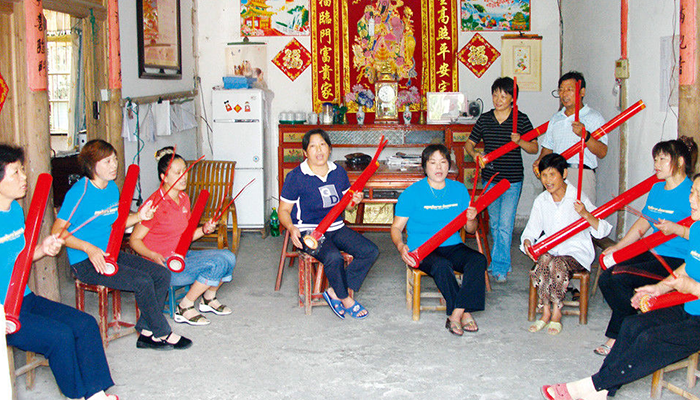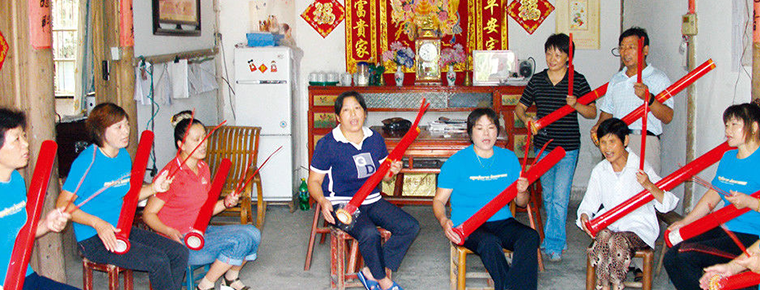Jinhua Taoism
Jinhua Taoism
Jinhua Daoqing is also known as singing news and persuading Shiwen. It is a traditional rap art in Zhejiang Province. It combines with Hangzhou gongshu, Wenzhou drum lyrics, Ningbo walking book and Shaoxing lotus fallen, and is called the five local songs of Zhejiang Province. From the Ming Dynasty to the 1950s and 1960s after liberation, it has been a popular recreational activity among Jinhua people. It is the art of sitting and singing with one person and many roles. Sing a paragraph and say a few sentences, with simple actions, that is, the so-called "artist a play, acting the text and acting the martial arts myself". The accompaniment instrument is very simple, only one love tube and two bamboo boards. Jinhua Daoqing is one of the most popular traditional folk art forms in Jinhua. Taoist sentiment has been circulating in Jinhua for at least 300 years.
On June 7, 2008, Jinhua Daoqing, jointly declared by Jinhua City and Yiwu City of Zhejiang Province, was listed in the second batch of national intangible cultural heritage lists with the approval of the State Council.
Heritage serial number: 771 V-78.
historical origin
Taoist sentiment is a category of Chinese traditional opera. It originated from Taoist songs such as Chengtian and Jiuzhen in Tang Dynasty. The Southern Song Dynasty began to accompany with fishing drums and cylindrical boards, so it is also known as sentimental fishing drums. By the Qing Dynasty, Dao and Qing Dynasty combined with traditional folk music of different places to form a variety of forms of homology and divergence, such as Dao and Qing in northern Shaanxi, Dao and Qing in Jiangxi, Yugu in Hubei, Zhuqin in Sichuan and so on. Taoist sentiment is mainly composed of singing, supplemented by speaking. There are sitting singing, standing singing, singing, counterpart and other forms of performance.
Jinhua Daoqing is the product of the difficult living conditions of blind artists in the old times, and also the product of the times. In the era of traffic congestion and information closure, folk artists who traveled from village to village acted as the media of information and became the main source of education and art enjoyment for peasant workers, businessmen and villagers in the old era; during the Anti-Japanese War, Jinhua Daoist sentiment was the horn for new literati to awaken the public; after the founding of the People's Republic of China, with the care of the Party and the government, Jinhua Daoist sentiment continued to serve our country. Economic construction advocates. Jinhua Daoqing is a Lower Liba people. In the bustling sound of fishing drums and simple "Jipeng Jipeng Jipeng", Jinhua Daoqing condemns evil and persuades people to be good. Jinhua Daoqing always ends with a happy ending, giving people living at the bottom of society a kind of belief and expectation of life. Through the inheritance and creation of generations and even tens of generations, Jinhua Daoqing's art treasure house has been extremely rich. Taoist sentiment is strong, and there is seldom a form of folk art like Jinhua Taoist sentiment, which is rich in hundreds of repertoires. Its stories are derived from the life experience of Jinhua people and are based on the social news happening in Jinhua.
It is this kind of folk folk art that will disappear quickly from our eyes under the impact of modern art and modern life.
Taoist sentiment originated from court music in Tang Dynasty. In Southern Song Dynasty, it was accompanied by ballad singing. After the Yuan Dynasty spread around, the singing forms were also different. Zheng Banqiao once created a Sanqu-type "Ten Songs of Tao" for people to sing. After Taoism was introduced to Jinhua in the late Ming Dynasty, it took root and evolved in Wudi, and then spread to eight counties in Jinhua, Quzhou, Lishui and some mountain townships in eastern Jiangxi and northwestern Fujian.
In the early Qing Dynasty, artists in Jinhua had compiled a legendary homicide case of Chongzhen Ming Dynasty (1630) that took place in Zhuma Hall to his homeland into a biography of "Regret for My Family". During the period from Qingdaoguang to Guangxu, Jinhua Daoqing was more prosperous. For example, Yudong, a famous artist in Jinhua City, sang "Regret for His Family", "Diaoyu Ji", "Seven Heads", "Double Pearl Flowers" and "Huangliang Umbrella". From Daoguang, Tongzhi, Xianfeng to Guangxu years, Jinhua Daoqing Daoqing Daoqing had a long history of singing.
In the later period of Guangxu, Xing Zhaolan, a disciple of Yudong, had worked as an agent in Jinhua County Yamen. He was familiar with Yamen's case handling and criminal cases. After learning to sing Taoist sentiments, he compiled the legendary official cases that happened in the local area into the biographies of "Nuns", "Jinhuang Ji", "Hupai Ji", "Keliu Ji", "Traffickers Ji" and so on. Around this time, many artists in Jinhua compiled the Yamen case, social news and major folk events into Taoist songs, such as "Yinyang Tang" in the Muxiangxiangxiang Lane of Jinhua City, "Two Emotions" in the Wuli archway in the south of Jinhua City, "Qitou Ji" in the street of Fushang, "Shuanglions" in Lianhuajing, "Nun Ji" in the house street, and "Burning Mountain Ji" in Tangxi, as well as the occurrence of the Ming Dynasty. In Luobu, "Golden Phoenix Crown" and so on. There are more than 40 copies in Jinhua City and surrounding villages, including nearly 100 tracks in eight counties of Jinhua.
Representative repertoire
These Taoist melodies have been processed and perfected by generations of folk artists in their singing. The plots are tortuous, ups and downs, the characters have distinct personalities and the language is rich and colorful. For example, the heroine Wang Fengying is described as beautiful in "Double Pearl Flowers". Wang Fengying walks through Jinhua Street and attracts the attention of shop owners on both sides.
"When the shaver saw Wang Caiying, he was not sure if he had a razor in his hand. Shala, Shala, shaved his brows bald and flat on both sides of a man's eyebrows.
When the master saw Wang Caiying, he was not sure what to do with the hammer. He couldn't figure out what to do with the iron. The kitchen knife was hammered into a coffin nail.
When the master saw Wang Caiying, the two "two" of the urine bucket were completely cut off, so he had to change the urine bucket to the steamer.
When the tailor saw Wang Caiying, he took scissors with uncertain accuracy, cut up his trousers and changed his apron, and opened the collar of his shirt to the back.
It is unique and more artistic.
Inheritance and protection
From more than 30 kinds of songs in the whole province and hundreds of folk arts in the whole country, it is rare that there are so many songs compiled by local stories in a region like Jinhua Daoqing. These oral literary works are precious cultural heritage of Jinhua Bawu. With the decrease of folk artists, they are in urgent need of rescue.


-
1.Free and unfettered hu hot soup
The authentic Xiaoyao Town Hu Hot Soup, produced in Xiaoyao Town, Xihua County, Zhoukou City, Henan Province, is a famous snack in China
Time 2018-11-26 -
2.Hani terrace Yuanyang terrace
Yuanyang Terrace, located in the south of Ailaoshan Mountain in Yuanyang County, Yunnan Province, is a masterpiece left by the Hani people from generation to generation. Yuanyang terrace is the core a
Time 2019-01-13 -
3.The Story of Barragan
Stories of witty figures of the Mongolian people in China. Long-term spread in Inner Mongolia, Xinjiang and other Mongolian areas. The protagonist Balagan Cang is the representative of the working peo
Time 2019-04-02 -
4.Tibetan Metal Forging Technology
Zhaxi Coloured Gold, Silver and Copper Processing Plant in Xikaze City, Tibet, has a long history. It is the earliest gold and silver bronze enterprise in the region with strong technical force
Time 2019-04-08 -
5.Fuxin agate carving
Fuxin agate carving, traditional art of Fuxin County, Liaoning Province, is one of the national intangible cultural heritage.
Time 2019-04-30 -
6.Huai Bang
Huai Bang (also known as Huai Diao, commonly known as Huai Qing Bangzi, Lao Huai Bang, Xiao Bang Opera and Xiao Ban Opera), is one of the traditional local operas in Henan Province and one of the nati
Time 2019-05-04 -
7.Shijiazhuang Silk String
Shijiazhuang silk string is also known as string tune, string tune, Hexi tune, small drum tune, Luoluo tune, daughter tune and so on. It is a local traditional drama in Hebei Province and one of the n
Time 2019-06-15 -
8.Left Foot Dance of Yi Nationality
The left foot dance of the Yi people, which is called "Gouzha" in the Yi language, falls to the left foot. Dao Guangnian's Dingyuan County Chronicle says, "It's called falling on the le
Time 2019-07-13 -
9.Cai Yong
Cai Yong (133 to 192 years), Zi Bo. Chen Liu Jun Xian county (now Henan Qixian County South) People. Eastern Han Dynasty Famous ministers, writers, calligraphers, talented women Cai Wenji Father.
Time 2019-09-14 -
10.Tamdrin Dingzhen
Zhaxi Dingzhen (Chinese Name: Ding Zhen), born in 2000, lives in Litang County, Ganzi Prefecture, Sichuan Province.
Time 2020-12-01 -
11.Suining medical and health
By the end of 2019, there are 3725 medical and health institutions in Suining, including 76 hospitals (63 private hospitals) and 3622 primary medical and health institutions; there are 21400 beds in medical and health institutions and 18200 health technicians
Time 2020-12-16 -
12.Animal resources in Meishan
There are many species of wild animals in Meishan City, and the floristic composition is more complex, mainly subtropical forest animals. There are 469 species of terrestrial wild (vertebrate) animals, including 91 species of mammals, 18 orders, 27 families, 65 genera,
Time 2020-12-18